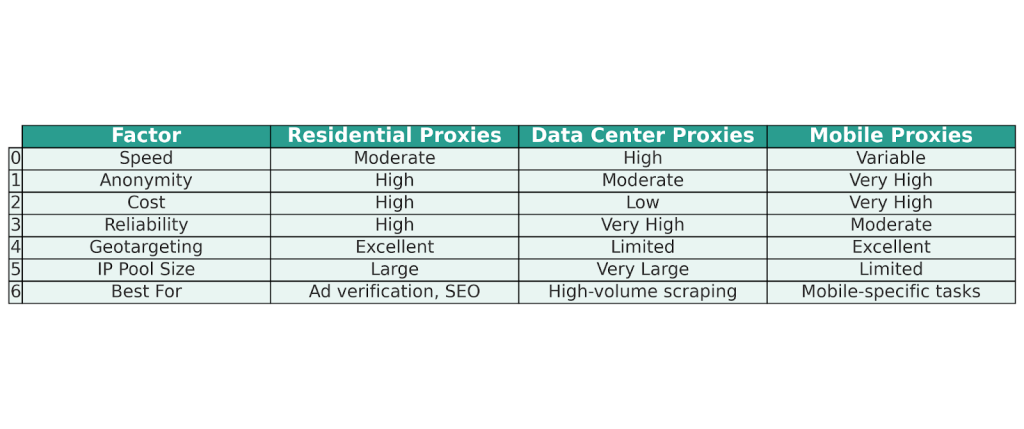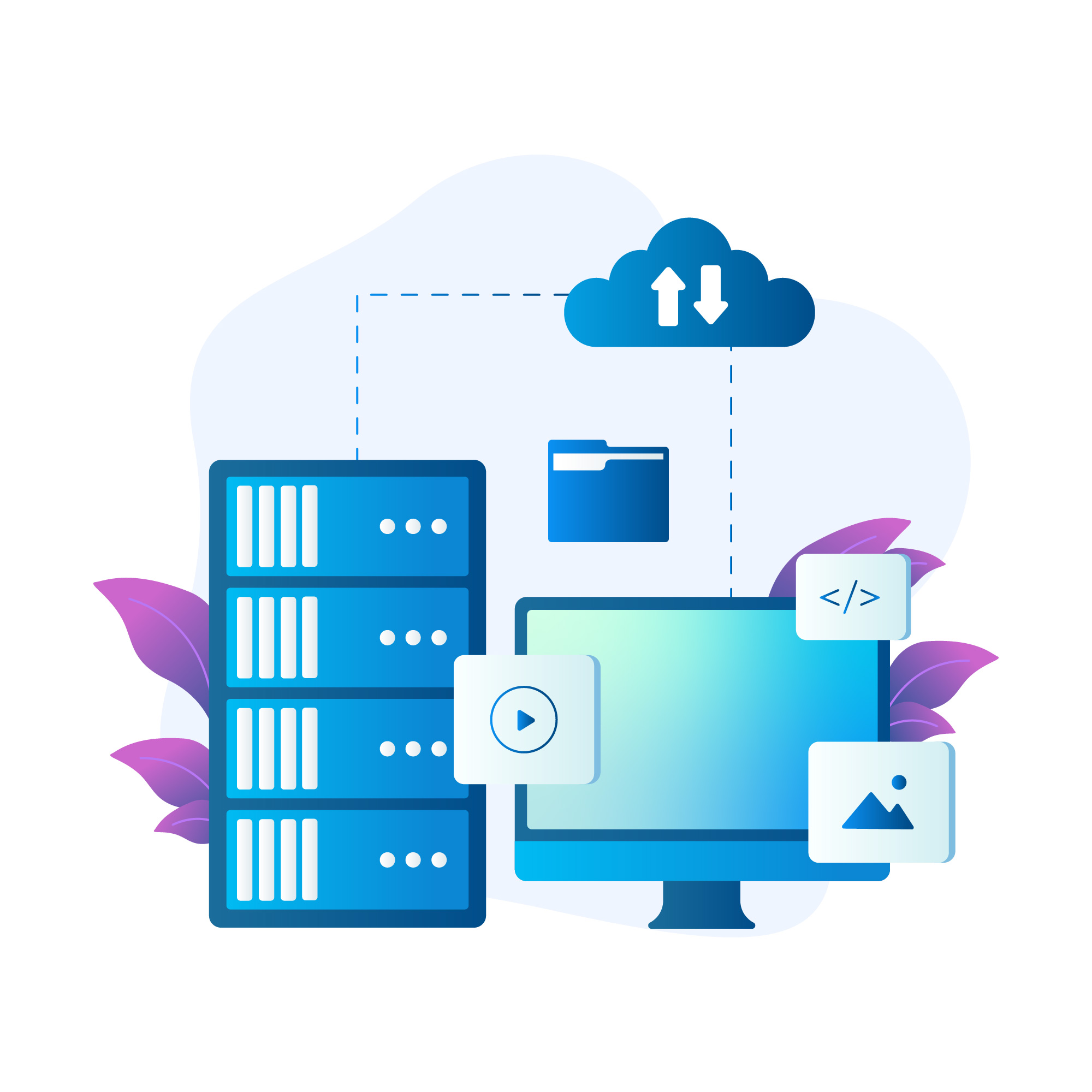For SEO agencies, digital marketers, and website owners, selecting the appropriate proxy type can significantly impact the success of web scraping initiatives, competitor analysis, ad verification processes, and overall online anonymity. Leveraging industry knowledge from platforms like infatica.io, we analyze residential, data center, and mobile proxies to help you choose the most effective solution for your specific business needs.
Table of Contents
Understanding Proxy Servers
Proxy servers act as intermediaries between a user’s device and the target website or service. When you connect through a proxy, your request is routed through the proxy server before reaching its destination. This process masks your original IP address, replacing it with the proxy’s IP address.

This intermediary role offers several key benefits:
- Anonymity: By concealing your real IP address, proxies enhance online privacy and reduce the risk of targeted attacks.
- Geolocation spoofing: Proxies allow users to appear as if they’re browsing from different geographical locations, enabling access to region-restricted content.
- Load balancing: Large-scale operations can distribute requests across multiple proxies, improving performance and reliability.
- Content filtering: Organizations can use proxies to control and monitor internet usage within their networks.
Residential Proxies
Residential proxies are IP addresses assigned by Internet Service Providers (ISPs) to homeowners and other residential customers. These proxies route your internet traffic through real residential IP addresses, making your online activities appear as if they’re coming from genuine home users.
Key features of residential proxies include:
- IP addresses tied to physical locations.
- Dynamic IP rotation capabilities.
- High level of authenticity.
Advantages
- Superior anonymity: Websites struggle to distinguish residential proxy traffic from legitimate user traffic, reducing the risk of detection and blocks.
- Geographical accuracy: These proxies accurately represent real users in specific locations, crucial for location-based testing and market research.
- Diverse IP pool: Access to a wide range of IPs from various ISPs enhances the ability to bypass IP-based restrictions.
Disadvantages
- Higher cost: The authenticity and difficulty in acquiring residential IPs make these proxies more expensive than data center alternatives.
- Potential speed limitations: Traffic routing through residential networks may result in slower connections compared to data center proxies.
- Ethical considerations: Ensure your proxy provider obtains residential IPs through legitimate means to avoid legal and ethical issues.
Best use cases for businesses
- Social media management and automation.
- Accurate ad verification across different regions.
- Precise SEO rank tracking and SERP analysis.
- High-stakes web scraping projects requiring maximum anonymity.
Data Center Proxies
Data center proxies are IP addresses that originate from secondary corporations and web hosting services, not directly from Internet Service Providers. These proxies are created in bulk within powerful servers housed in data centers.
Key features of data center proxies include:
- High-speed connections.
- Large pools of available IPs.
- Often organized in subnets.
Advantages
- Speed: Data center proxies typically offer faster connections due to their robust infrastructure, ideal for tasks requiring quick data retrieval.
- Cost-effectiveness: Generally more affordable than residential or mobile proxies, allowing for scalable operations.
- Reliability: With dedicated hardware and maintenance, data center proxies often provide more stable connections.
Disadvantages
- Easier detection: Websites can more readily identify data center IPs, potentially leading to blocks or CAPTCHAs.
- Lack of geographical diversity: May not accurately represent user behavior from specific locations.
- Subnet bans: If one IP is detected and blocked, an entire subnet of related IPs might be banned simultaneously.
Best use cases for businesses
- High-volume web scraping where speed is crucial.
- Initial stages of SEO research and competitor analysis.
- Load testing and performance monitoring of web applications.
- General anonymity for less sensitive online activities.
Mobile Proxies
Mobile proxies route internet traffic through cellular network IP addresses, mimicking users accessing the internet via mobile devices like smartphones or tablets.
Key features of mobile proxies include:
- IP addresses from cellular networks (3G, 4G, 5G).
- Often associated with specific mobile carriers.
- Dynamic IP rotation capabilities.
Advantages
- High anonymity: Mobile IPs are less likely to be flagged as suspicious, providing excellent cover for various online activities.
- Geotargeting precision: Ideal for accessing location-specific content or services tied to mobile networks.
- Diverse user profiles: Represent a wide range of real mobile users, enhancing the authenticity of your online presence.
Disadvantages
- Limited availability: The pool of mobile proxies is typically smaller than residential or data center options.
- Higher costs: The complexity of acquiring and maintaining mobile proxies often results in premium pricing.
- Potential speed variations: Connection speeds can fluctuate based on cellular network conditions and coverage.
Best use cases for businesses
- Mobile app testing and development.
- Location-based marketing research.
- Social media management requiring mobile device authentication.
- Precise ad verification on mobile platforms.
Each proxy type offers distinct advantages and challenges. The choice between residential, data center, and mobile proxies ultimately depends on your specific business needs, budget constraints, and the level of anonymity required for your online operations.
Comparison
Quick comparison between residential, data center and mobile proxies.

This comparison provides a high-level overview of the strengths and weaknesses of each proxy type. However, the effectiveness of each option can vary depending on specific use cases and implementation strategies.
Choosing the Right Proxy for Your Business
Selecting the optimal proxy type for your business requires careful consideration of several factors:
- Project requirements:
- For high-volume data scraping with less concern for IP detection, data center proxies might suffice.
- For tasks requiring utmost anonymity or geolocation accuracy, residential or mobile proxies are preferable.
- Budget constraints:
- If cost is a primary concern, data center proxies offer the most economical solution.
- For projects where accuracy and anonymity outweigh cost considerations, invest in residential or mobile proxies.
- Target websites:
- Analyze the anti-bot measures of your target websites. Sophisticated platforms may require the higher anonymity of residential or mobile proxies.
- Scale of operations:
- For large-scale projects, consider the size of the IP pool and rotation capabilities offered by different proxy providers.
- Specific use cases:
- SEO monitoring might benefit from a mix of proxy types to simulate various user behaviors.
- Mobile app testing or mobile-specific market research necessitates mobile proxies.
- Legal and ethical considerations:
- Ensure your proxy usage complies with relevant laws and website terms of service.
- Verify that your proxy provider obtains and manages their IP addresses ethically.
Remember, the proxy landscape is dynamic. Regularly reassess your proxy strategy to ensure it continues to meet your evolving business needs and adapts to changes in target website detection methods.

Andrej Fedek is the creator and the one-person owner of two blogs: InterCool Studio and CareersMomentum. As an experienced marketer, he is driven by turning leads into customers with White Hat SEO techniques. Besides being a boss, he is a real team player with a great sense of equality.
